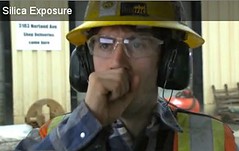I read recently that two of the rescued Chilean miners have silicosis – an occupational disease that leads to severe lung damage. It usually takes many years (or decades) for workers to develop it after exposure to particles of silica, which is the basic component of sand and rock.
Any workplace activity that creates dust can expose workers to silica dust particles. It’s not only a problem for the Chilean miners, but also affects workers here in Canada.
Geoff Clark, a senior occupational hygienist with WorkSafeBC, is working hard to educate employers about the risks of this insidious occupational disease. He and his colleagues have been working with industry to produce toolbox talk guides, exposure control plans, and other resources for employers (see links below).
When I asked Geoff how prevalent the disease is, he said it’s hard to say because so many cases of the disease aren’t attributed to occupational causes: “If somebody has trouble breathing and doesn’t tell their physician what they do for a living, the doctor might say: ‘You have asthma. We’ll put you on an inhaler’ and no one ever puts two and two together.”
Geoff said it’s a challenge to convince people in their 20s to take precautions against something that may not affect them til the distant future. “How do you explain to them that their behaviour right now is going to make a difference in the next 30 or 40 years? Many of them aren’t even thinking past the next pay cheque or the next pub crawl.”
But Geoff isn’t giving up easily and he’ll keep trying to get the message out there. To that end, Geoff will be speaking about silicosis and other lung-threatening substances at the 2010 Construction Safety Conference on November 19 and 20 in Richmond, BC.
Here’s more information on the dangers of silica and how to prevent exposure. You can also download WorkSafeBC’s toolbox meeting guides and Developing a Silica Exposure Control Plan.




Perhaps it is time to look more closely at all occupations especially those which create respiratory illnesses. What initially comes to mind is the numerous bike couriers who weave their way through grid-lock traffic where increased fumes create harm which only shows up years later.
Absolutely! I know a lot of bike couriers, actually – especially retired ones in their late 30s/early 40s and a few veterans in their 50s. This is a group that has a lot of workplace related dangers – and I’ve seen a lot of car crash related injuries among those I know. If it’s not getting hit by the traffic, it’s breathing in the fumes. Thankfully one of my best pals (now 52) is working inside, away from traffic, as a dispatcher. Many of the couriers smoke, too, so it would be interesting to see long term follow-up on lung health of this group. (though of course I hope everyone is okay!)
Pingback: 8 Safety Stories You May Have Missed That Make You Go Hmmmm